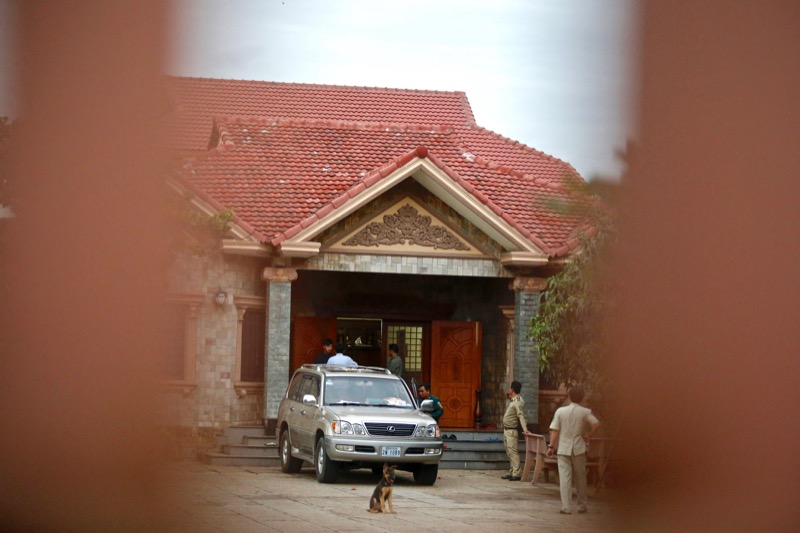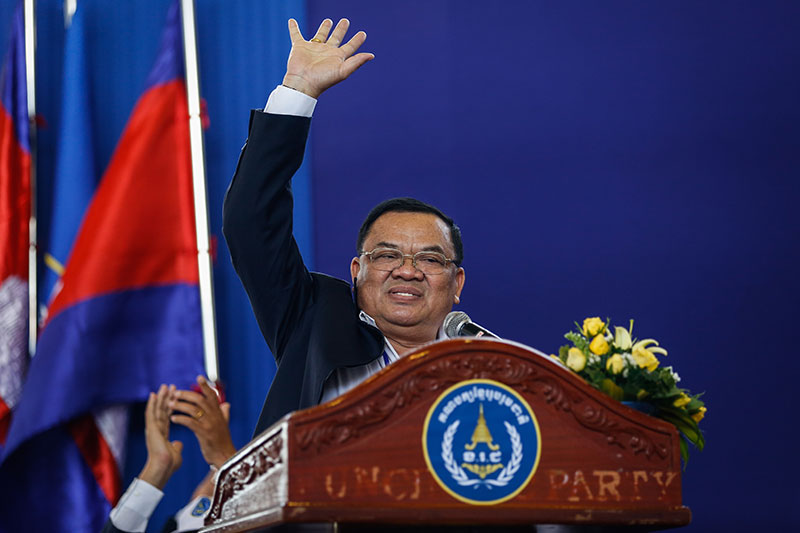Embattled KNUP president Nhek Bun Chhay was on Sunday charged in connection with a 10-year-old drug case, just as the ruling CPP was going after him and his party, because a prisoner came forward with fresh accusations, the Phnom Penh Municipal Court said in a statement.
“The Phnom Penh Municipal Court prosecutor has decided to charge Nhek Bun Chhay, 59, of being an accomplice to drug production and importing substances to produce drugs, and to send the case to an investigating judge to take further action,” said the statement, issued on Sunday by court spokesman Ly Sophana.

“The charge was made following a letter dated July 24, 2017, by convict Chea Chung, who accused and identified the names of other Chinese ringleaders and…Nhek Bun Chhay in 2007’s biggest drug case,” the statement said.
Mr. Bun Chhay has been under fire from authorities since June when he was allegedly recorded speaking to the opposition CNRP on the telephone and pledging his support.
He was sacked from a government adviser role shortly after, and members of his party were progressively culled from government jobs.
A ruling party spokesman admitted last month that every member of Mr. Bun Chhay’s Khmer National United Party was being targeted because “when partners in friendship aren’t honest with each other, we must end it.”
Mr. Bun Chhay, a former general during the time the royalist Funcinpec party shared power with the CPP in the 1990s, was questioned on Thursday through Sunday over the 2007 drug case.
The April 1, 2007, raid had discovered no actual drugs, but approximately six tons of chemicals that authorities said at the time were precursors used in the manufacture of methamphetamines.
From December 27, 2007 to January 2008, a total of 21 suspects were brought before the courts in what was at the time the country’s largest-ever narcotics case.

Chea Chung, a former adviser to Mr. Bun Chhay between 2004 and 2007, was handed a 25-year sentence and fined $25,000, alongside several others who were also handed lengthy prison terms, the court statement said.
On July 31 this year, the Phnom Penh court prosecutor received a letter from Mr. Chung, now 52, “seeking justice” in the case by identifying others involved, including Mr. Bun Chhay, it said.
Y Rin, another court spokesman, said that Mr. Bun Chhay was now being held at Phnom Penh’s PJ prison.
Chin Malin, a spokesman for the Justice Ministry, defended the court’s belated action against Mr. Bun Chhay, saying that he had been arrested only because authorities found new evidence implicating him in the 2007 drug case.
“Now the action is taken because new evidence against him is found,” Mr. Malin said.
Cambodia’s justice system has been repeatedly criticized as lacking independence and being used as a political tool by the ruling party.
Last year, CNRP President Kem Sokha came under legal pressure over a supposed “prostitution” case relating to an alleged mistress. Five current and former human rights workers were detained for more than a year without trial for their purported involvement.
Rhona Smith, the U.N.’s special rapporteur on human rights in Cambodia, decried the case as well as others at her departing media conference during her visit in October.
“There are many examples of the law being applied in an apparently discriminatory or politicized manner,” she said at the time. Ms. Smith is due to visit the country again on Tuesday for her latest fact-finding mission.



